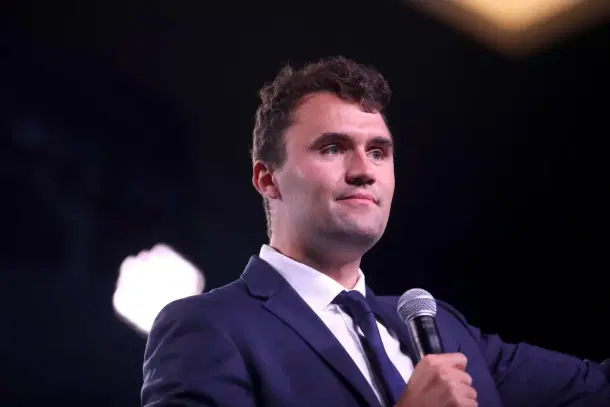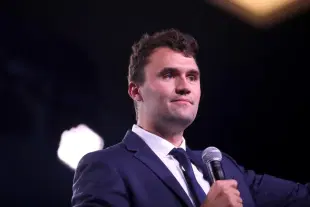Commentary
The Illiberal Paradox: When Free Speech Becomes A Partisan Privilege
Tejashwini V
Sep 11, 2025, 06:04 PM | Updated Sep 12, 2025, 08:34 AM IST
Save & read from anywhere!
Bookmark stories for easy access on any device or the Swarajya app.


“If you believe in something, you need to have the courage to fight for those ideas, not run away from them or try to silence them.”
These words encapsulate a fundamental truth about free societies. Truth emerges not from a protected class of “correct” opinions, but from the messy, often uncomfortable clash of viewpoints.
Yet, a dangerous paradox has taken root in our modern discourse, one where a vocal segment of liberal thought appears to champion freedom of speech only when it aligns perfectly with its own agenda. This alarming, overlooked trend has not just silenced debate, but in tragic cases, escalated to outright violence against those who dare to dissent.
The recent assassination of conservative American activist Charlie Kirk is a stark and disturbing example of this crisis. This is not a defence of his specific views, which were often perceived as controversial and a lightning rod for debate. It is a reminder of the horrifying outcome of a political climate where opponents are not merely disagreed with, but actively dehumanised.
This incident serves as a grim warning about a culture that has replaced intellectual engagement with moral condemnation and, tragically, has shown a capacity for violence when words are deemed insufficient. Adding to this is a disturbing layer of celebration in favour of assassination and gun violence when it helps a certain cause.
“When people stop talking, that’s when you get violence.”
What we are witnessing is a fundamental shift in the intellectual background. The left has long been adept at intellectualising its positions, successfully embedding its worldview in academia, media and popular culture. This is a legitimate and often effective way to win hearts and minds. The problem arises when the same intellectualising approach, when attempted by the right, is not afforded the same respect.
When conservative voices make valid, rational points, they are often dismissed out of hand and then punished. Their arguments are not engaged with. Instead, they are branded as “hate speech” or “misinformation”, effectively shutting down any possibility of genuine dialogue. This is a new and deeply illiberal form of censorship, a way of silencing dissent without ever having to win the argument.
This dynamic is particularly pronounced among today’s youth. As evidenced in Kirk’s numerous interactions on platforms like Jubilee and on college campuses, a generation has been conditioned by algorithms to hold strong, unwavering opinions based on half-baked knowledge.
The tragedy of our time is the death of open-minded exchange, the willingness to listen, to understand and to potentially change one’s stance based on reason and newly learned facts. The constant validation from online echo chambers has created a generation that feels no need to justify its beliefs, only to defend them with tribalistic fury.
This trend is not confined to the West, but is a growing and dangerous force in India as well. A concerning pattern has emerged where our educational institutions and intellectual spaces, once bastions of pluralistic thought, appear to have been hijacked by one dominant school of thought.
Critics and concerned observers have raised alarms about the humanities and social sciences departments of prestigious institutions, alleging that they have abandoned academic neutrality in favour of specific ideological agendas. Universities mirror online echo chambers, where certain viewpoints, particularly those that align with India’s civilisational ethos, are suppressed while others are actively promoted.
Academics who openly organise anti-government protests and mislabel decisions as “Constitutionally illegitimate” are often praised for being “brave and admirable”. The anti-establishment stances they take, including terming “Islamophobia as central to India’s political and social discourse”, are heralded as torch-bearers of freedom of speech.
This double standard is a direct manifestation of the paradox at hand. While one side is free to publish socialist magazines and openly express a desire to radicalise the population, the other side is punished for merely taking a rational argument stemming from a different worldview. The playing field is not just uneven, it is broken.
The horrifying implications of such a climate call for a deeper consideration not just of who gets to speak, but how speech is conducted. This compels us to acknowledge the reciprocal responsibility of those who exercise free speech. This does not mean pulling punches on uncomfortable truths, but rather engaging in a manner that, while firm in conviction, avoids gratuitous personal attacks and contributes to a more productive, rather than poisonous, public square.
The erosion of a truly free marketplace of ideas threatens the very fabric of democratic societies. When intellectual discourse is replaced by mere certitude, and when dissenting voices are silenced rather than engaged, we pave the way for a society where violence becomes the ultimate arbiter of truth.
To reclaim genuine intellectual freedom, we must challenge this illiberal paradox and foster environments that prioritise open dialogue over ideological purity. Remember that the strength of our convictions is tested not by silencing opposition, but by the courage to engage with it, however uncomfortable it may be. The future of a vibrant, democratic society, and of our generation, depends on it.
Tejaswini V is a policy consultant specialising in economic and foreign affairs. An alumna of the London School of Economics, she has experience in agriculture, textiles and domestic policy research.





